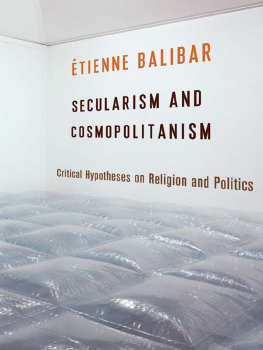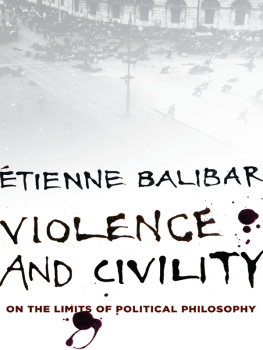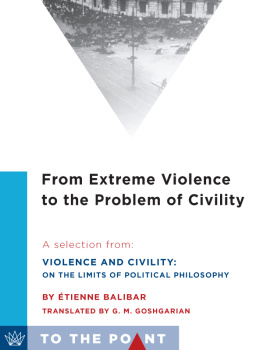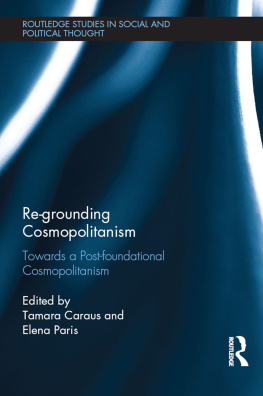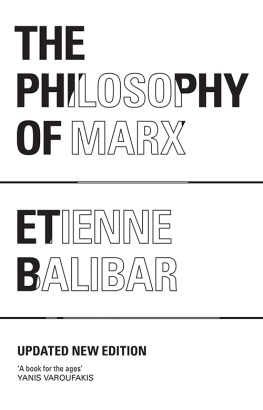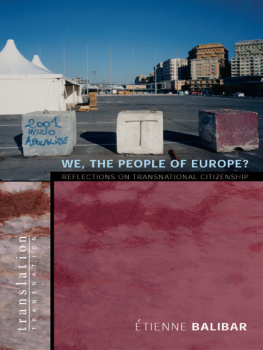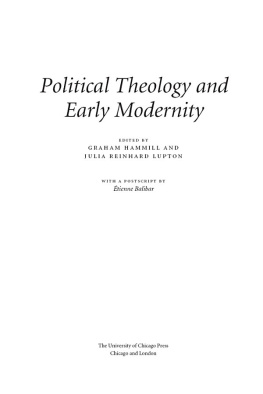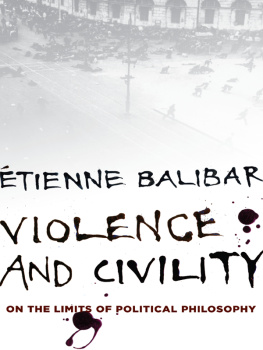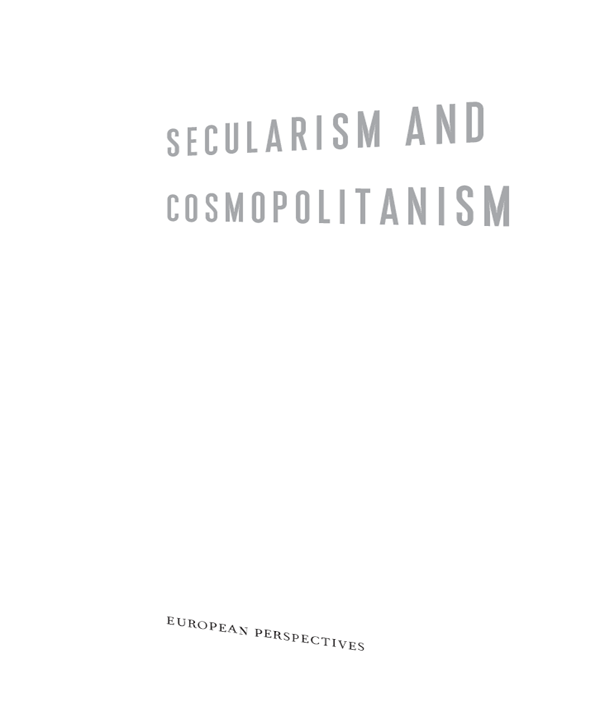Table of Contents
EUROPEAN PERSPECTIVES
A Series in Social Thought and Cultural Criticism
LAWRENCE D. KRITZMAN, EDITOR
European Perspectives presents outstanding books by leading European thinkers. With both classic and contemporary works, the series aims to shape the major intellectual controversies of our day and to facilitate the tasks of historical understanding.
For a complete list of books in the series, see .
COLUMBIA UNIVERSITY PRESS
Publishers Since 1893
New York Chichester, West Sussex
cup.columbia.edu
Copyright 2018 Columbia University Press
All rights reserved
E-ISBN 978-0-231-54713-0
Saeculum published in French as Saeculum: Culture, Religion, Idologie, copyright 2012 ditions Galile
God Will Not Remain Silent: Zionism, Messianism, and Nationalism published in French in Agenda de la Pense Contemporaine, No. 9, Hiver 2007. English translation published in Human Architecture. Journal of the Sociology of Self-Knowledge, VII, 2, Spring 2009, 12334.
Reprint by author and journal permissions. Balibar, Etienne (2009) God Will Not Remain Silent: Zionism, Messianism, and Nationalism, Human Architecture: Journal of the Sociology of Self-Knowledge: Vol. VII, Issue 2, pp. 12334; issue title: Historicizing Anti-Semitism. Issue co-editors: Lewis R. Gordon, Ramn Grosfoguel, and Eric Mielants. Journal editor: Mohammad H. Tamdgidi. Available at http://www.okcir.com/16HAVII2Sp2009.html.
Library of Congress Cataloging-in-Publication Data
Names: Balibar, Etienne, 1942 author.
Title: Secularism and cosmopolitanism : critical hypotheses on religion and politics / Etienne Balibar.
Description: New York : Columbia University Press, 2018. | Includes bibliographical references and index.
Identifiers: LCCN 2017061567 (print) | LCCN 2018010919 (e-book) | ISBN 9780231547130 (e-book) | ISBN 9780231168601 (cloth : alk. paper)
Subjects: LCSH: Secularism. | Cosmopolitanism. | Religion and politics.
Classification: LCC BL2747.8 (e-book) | LCC BL2747.8.B2954 2018 (print) | DDC 201/.72dc23
LC record available at https://lccn.loc.gov/2017061567
A Columbia University Press E-book.
CUP would be pleased to hear about your reading experience with this e-book at .
JACKET IMAGE: LEE EUNJONG, GM #0416, MUSEUM PROJECT 2011
BOOK AND JACKET DESIGN: CHANG JAE LEE
CONTENTS
I n this book, I have collected three groups of texts, to illustrate what I believe to be the importance of a new critique of religion in the contemporary world, to indicate some of its objects, highlight some of the reasons for its practical urgency, and contribute to its development.
would greatly benefit from the theoretical distinction between religious and cultural dimensions of social practice that a renewed concept of ideology in the post-Marxist sense makes possible; and, second, that confrontations between religious traditions and secular discourses and institutions must now become reframed from a cosmopolitan point of view that fully takes into account the relativization of borders, the hybridization of cultures, and the migrations of populations which have restructured our postcolonial world. I proposed that these phenomena intensify and redefine the perception of anthropological differences which are permanently at stake in symbolic differends, particularly among religions and between religions and secular discourses. These issues are intrinsically philosophical (if we understand philosophy as a discipline that continuously exchanges questions and notions with anthropology and other social sciences), but they are also immediately political, with highly conflictual or violent dimensions that verge on a state of endemic war of all against all, leaving us no intellectual or moral security. Because I wanted to overcome past shortcomings, introducing what I hoped was a better sense of the complexity and ambivalence of our historical, juridical, and hermeneutic categories, while not avoiding taking sides in the controversies about the universal in which some major intellectuals of our time have been involvedwhich also matter to every citizenI tried to define a strategy through the somewhat utopian notion of the secularized secularism (or desacralized secularism). Borrowing Fredric Jamesons famous category and using it in my own way, I proposed that it could serve as a vanishing mediator in the multifaceted conflict of rival universalities. However elusive it may appear, this notion remains the guiding thread of all the subsequent parts of the volume, not as a solution or a fixed concept, but as an instrument to criticize existing rules, construct genealogies, and make room for political imagination.
although in Republican ideology it is supposed to be supremely universalistic are both concerned with singular figures of the articulation of religion and nationalism, in which many of us find ourselves caught directly or indirectly. This is the core of the modern theologico-political complex, or better said: it was its core, before the cosmopolitical dimension discussed in Saeculum passed from margin to center. But, of course, it is an unfinished, perhaps interminable transition, in which the issues of the past spectrally haunt the present. Taken together, the three essays will hopefully help clarify a situation in which, as I explain in Saeculum and elsewhere, the crisis of modern civic, national, therefore secular universality has irreversibly begun while the crisis of traditional monotheistic religious universality is still in progress, without predictable end, creating something like a double bind for our ethical and political orientations.
In the second group, with the title Statements, I collected three shorter writings, more recent and more directly interrelated (dated 2015 and 2016, revised in 2017), which are ordered in sequence. They follow the dramatic events that took place in France and some of their consequences on French society and politics, between the attack on the journal Charlie Hebdo and the mass killing on the Nice Riviera in the following year, each time perpetrated by organized or individual Islamic terrorists. As a citizen and an intellectual, I reacted with a mixture of immediate sensitivity and ex post factum reflections. What I thought I could say, trying to influence the public debate in a modest way, was directly linked to my general problematic on religion, culture, and ideologyotherwise, what good could it be?but it was not exactly an application of theoretical notions to a concrete situation in which we are caught ourselves. On the contrary, illustrating a concept of theory (and critique) as a conjectural and conjunctural science, I tried to use the situation, however tragic, to rectify my hypotheses (particularly on the issue of conflicting universalities on the global market, and the political ambivalence of secular discourses). There is no pretention here of offering a complete interpretation of Islamic terrorism as a geopolitical, social, and subjective phenomenon. Nevertheless, I make intellectual efforts to stand the middle ground between reductionist discourses of opposite tendencies. I reject the idea that terrorism is a product of Islam

